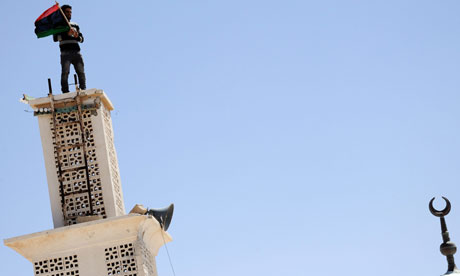Libya: rebel defences 'failing' as Gaddafi forces move towards Benghazi
Soldiers loyal to Muammar Gaddafi reach heart of strategic town of Ajdabiya, 90 miles from city at centre of revolution

A Libyan rebel fighter waves a Libyan flag from the roof of a mosque in Ajdabiya. Photograph: Vassil Donev/EPA
Muammar Gaddafi's forces continued to fight their way toward Benghazi, the city at the heart of Libya's revolution, as five African leaders arrived in Tripoli in an attempt to broker a ceasefire and political settlement.
Rebel defences around Ajdabiya appeared to be failing as Gaddafi's soldiers broke into the heart of the strategic town, 90 miles from Benghazi, and engaged in running street battles after again outmanoeuvring the revolutionaries.
Although western powers continued their air strikes, the strikes did not appear to deter Gaddafi's forces.
Rebels said government forces shot down a Russian-made helicopter sent to the fight by revolutionaries only two days before. Nato forced a rebel MIG jet to land because of the UN-imposed no-fly zone.
Shelling around the southern entrance to Ajdabiya continued , with loud explosions heard and thick black smoke rising over parts of the town.
Much of Ajdabiya was deserted after civilians fled amid the prospect of Gaddafi's troops taking the town for the second time in as many weeks.
Thousands of discarded bullet casings littering some streets marked sites of intense shooting over the weekend.
"Gaddafi's military is in the town," said Saleh Mufta, a 25-year-old who was a science student before becoming an armed rebel.
"There's been a lot of shooting. Gaddafi has copied our techniques. He is not using so many tanks now after the air strikes. His men are in pickups. They move very fast. We don't know where they are. They just pop up."
Burned out cars were scattered through the city, and a mosque on the edge of town appeared to have been the scene of heavy fighting. Bullets scarred much of the building.
Asked what he thought the government army's intent was, Mufta said: "They don't want Ajdabiya. They want the road to Benghazi. They want Benghazi."
Nato faces humiliation if Gaddafi's army is able to force its way through Ajdabiya again to threaten Benghazi, the city the western allies launched the first air strikes to defend.
Other than a line of artillery about 15 miles from the city, rebel defences around Benghazi are little in evidence.
The fighting continued as an African Union delegation, led by the South African president, Jacob Zuma, prepared to meet Gaddafi in Tripoli before flying on to talk to the rebels in Benghazi to press for a ceasefire.
Zuma has accused western powers of going against the "letter and spirit" of the UN security council resolution with the extent of air strikes, and has called for Gaddafi to be allowed to leave power "with dignity".
The other members of the delegationm include the presidents of Congo-Brazzaville, Mali, Uganda and Mauritania.
Mohamed Ould Abdel Aziz, the president of Mauritania, said: "We hope that mediation will lead to a constructive dialogue for a political settlement of the crisis based on the aspirations of the Libyan people."
But Libya's rebel leadership is sceptical about any political deal that does not require the immediate removal of Gaddafi from power or any ceasefire that does not require him to pull all his forces out of cities under attack, most importantly Misrata.
No comments:
Post a Comment